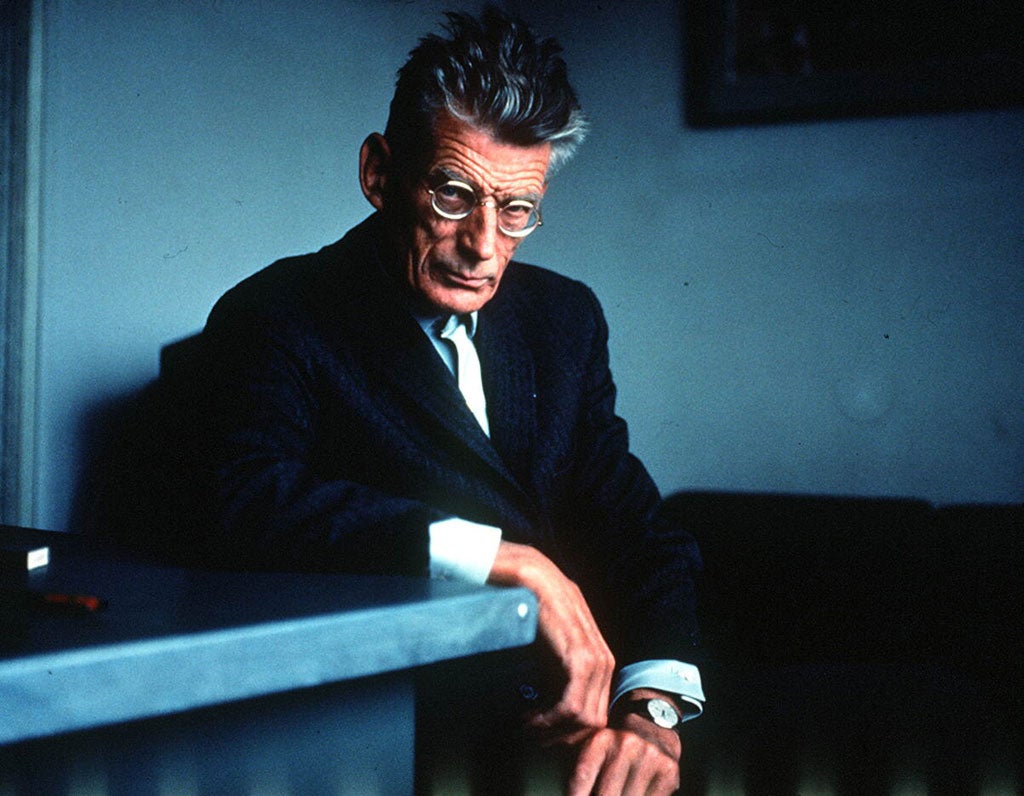The Letters of Samuel Beckett 1941-1956, Edited by George Craig, Martha Dow Fehsenfeld, Dan Gunn and Lois More Overbeck

Your support helps us to tell the story
From reproductive rights to climate change to Big Tech, The Independent is on the ground when the story is developing. Whether it's investigating the financials of Elon Musk's pro-Trump PAC or producing our latest documentary, 'The A Word', which shines a light on the American women fighting for reproductive rights, we know how important it is to parse out the facts from the messaging.
At such a critical moment in US history, we need reporters on the ground. Your donation allows us to keep sending journalists to speak to both sides of the story.
The Independent is trusted by Americans across the entire political spectrum. And unlike many other quality news outlets, we choose not to lock Americans out of our reporting and analysis with paywalls. We believe quality journalism should be available to everyone, paid for by those who can afford it.
Your support makes all the difference.This is the second volume of what looks set to be a major achievement of 21st-century publishing, an astonishing work of scholarship, appraisal and documentation. There are two more volumes to come. The first began in 1929, the year Samuel Beckett left Ireland for the first time, and took us up to 1940; the first letter in the current collection is dated 1945, since few letters were written during the war years, and fewer have survived.
Beckett and his companion Suzanne Deschevaux-Dumesnil were otherwise occupied during this period, working for the French Resistance and spending a lot of time "on the trot". Yet, the editors say, "the war years were decisive and formative". Hence the decision to place "1941" in the title, in unspoken acknowledgement of this fact.
Back in Paris following the Liberation of 1944, Beckett turns more and more to the French language as a medium of composition and communication - though a novel in English was completed early in the following year, and immediately ran into difficulties. Some correspondence at the start of this volume is concerned with the failure of literary agent AP Watt to place Watt.
The book was swiftly declined by Routledge, Methuen, Hamish Hamilton, Nicholson & Watson and Chatto & Windus ("Shatupon and Windup", according to Beckett), all of whom declared themselves unable to make head or tail of it. In a letter to his friend and sometime agent George Reavey, dated May 1947, Beckett himself calls Watt "an unsatisfactory book, written in dribs and drabs". It didn't come out in book form until 1953, at which point it was promptly banned in Ireland.
In the meantime, in a burst of creativity, he was writing, in French, Molloy, Malone Dies and The Unnameable, as well as the plays Eleutheria and Waiting for Godot. Letters 1941-1956 cover both extraordinarily prolific and arid periods in Beckett's work.
His success as playwright was fraught with contradictions. "I have no ideas about theatre. I know nothing about it. I do not go to it," he told one radio producer who had innocently solicited his "ideas". Equally, he claimed to know nothing about the "spirit" in which Godot was written. Beckett's famous - "mulish", he said himself - aversion to publicity or explication might have told against him, but in fact it had a contrary effect. After Godot, success overtook him, whether he liked it or not, and requests - for publishing rights, translation rights, extracts from works-in-progress and for his own translations - poured in from all sides. All were dealt with courteously but firmly. "I find it very difficult to talk about my work. And I have no wish to influence your production"; "Sorry for the no to design you seem to like"; "I would not give an interview, not to the Nouvelles Littéraires, not to anyone." So there.
Beckett's mother had died in 1950, releasing him from the obligation to spend part of each summer in his abhorred birthplace. "I can't work in Ireland," he assured one correspondent; and to another he expressed the opinion: "I think it is impossible to have health in Dublin. Of any kind." "On Ireland," he wrote, "it is utterly impossible for me to speak with moderation." Of the first Dublin production of Godot, however, he gained an impression - without having seen it - that "the Pike [theatre] seems to have made a gallant shot at it". This was in contrast to an earlier performance in Paris, at which "I ended up under the seat, moaning".
The erudite and indefatigable editors have put together an outstanding and illuminating selection from Beckett's correspondence with friends, acquaintances, publishers, translators, all kinds of business associates - all having a bearing, in some sense or other, on the imperishable work. But the highlight of this volume is undoubtedly the series of long, compelling, vivid and idiosyncratic letters written by Beckett to his good friend Georges Duthuit, art historian, essayist and editor of the journal transition.
Written in French, brilliantly translated by George Craig, these letters show the thoughtful, generous, trenchant and humorous sides of Beckett's personality. They contain jokes - on one occasion, reminding "dear old Georges" of a friend's maiden name: "Marthe's surname: Kuntz. Do not forget the Z" - profundities, ironies, self-deprecations. Duthuit, for his part, applauded a vital element in the Beckett oeuvre: "Sam - what a comic writer, when it comes down to it!"
And it was to Georges Duthuit that Beckett dashed off his jocular adaptation of Joyce's famous prescription for a modus operandi: "exile? don't know; cunning? not my style; silence? gladly". Fortunately the last does not extend to the works of literature, or to these wonderful letters.
Patricia Craig's memoir 'Asking for Trouble' is published by Blackstaff Press
Join our commenting forum
Join thought-provoking conversations, follow other Independent readers and see their replies
Comments